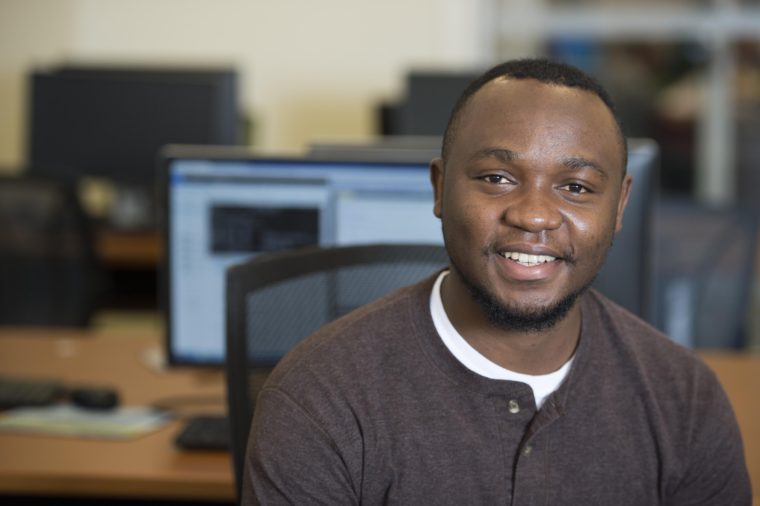Elie Mafolo didn’t know a word of English when he arrived in St. Louis, Missouri, from the Democratic Republic of Congo in 2012. Now, he’s on the Dean’s List at Washington University where he studies computer science in the School of Engineering & Applied Science.
When Mafolo came to St. Louis in 2012, he enrolled in St. Louis Community College–Forest Park’s English as a Second Language program, and within four months, he knew enough English to start taking classes there. In addition to his classes, Mafolo worked 37 hours per week, waking up at 5 a.m. most mornings and not getting back home until midnight. He was a housekeeper and tutor in French (his native language), math and science. During that time, Mafolo maintained a 3.8 GPA, made the National Dean’s List, was in Who’s Who Among Students in American Universities and Colleges, won the John Bunn Memorial Math Achievement Award and the Outstanding Academic Achievement Award, and he was a member of Phi Theta Kappa International Honor Society.
His counselor at Forest Park told him he’d be a good fit for the Women’s Society Elizabeth Gray Danforth Scholarship, which offers students from a St. Louis–area community college the chance to earn their bachelor’s degree.
“He’s an outstanding young man,” says Sandra Knight, Mafolo’s Forest Park adviser. “I knew he would be successful no matter where he went.”
Not surprisingly, Mafolo won the scholarship and has been excelling at Washington University ever since. He works for LaunchCode, which trains adults for jobs in technology, and is a member of the National Society of Black Engineers. When he graduates, he plans to stay in the U.S. and possibly start his own cybersecurity business.
How did you come to St. Louis?
I am from the Democratic Republic of Congo, and in 2010, I was in my last year of high school. I applied to universities back home, but I also applied for a program called Diversity Visa, which grants visas to people outside of the U.S. [who are] eventually going to become a permanent resident. I applied for it, and in 2012 I won, and I didn’t know where to go. I just knew that it was a visa for the U.S. My uncle knew a guy here; he’s a pastor [Rev. Beni-Christian Kibombi]. And [my uncle] put me in contact with him. So this is where I started everything. I moved to St. Louis because [Kibombi] was living here in St. Louis.
How did you come to WashU?
I was a student at the St. Louis Community College, and I knew that I was going to transfer to a [4-year university], and WashU was one of the ones I was considering. It was in the top for me. The problem was [being] able to afford the tuition. Then I went to see my adviser, Sandra Knight. She kind of looked at me and said, “OK, I think you’re a good student, and you’re going to make it to WashU — and you’re going to do good things there. So there is an opportunity here. There is a scholarship program, which is called the Elizabeth Gray Danforth [Scholarship].” From there, I started reading and looking [and] doing some research about the scholarship and how I was going to be able to make my way to WashU through the scholarship.
What’s it been like at WashU?
The big thing was — I think it was my first exam. I did a good job. I studied for it, and I had a 95 percent. I was super happy. I was really happy, because it was my first exam [at WashU]. When I came to class, the professor was talking about the exam, and he was like, “OK, you guys did a good job. The average of the exam is 96 percent.” That really shocked me. I was like, “How is it possible the average is 96 percent?” And I was below the average! That kind of shocked me and motivated me to work harder.
Being here has been really good for me because it’s kind of challenged me to bring out the best of myself. Being surrounded by people who are thinking great, doing great stuff and really studying hard … it’s just a good feeling.
